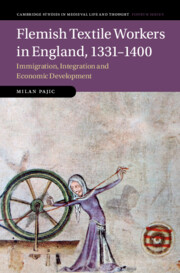Book contents
- Flemish Textile Workers in England, 1331–1400
- Cambridge Studies in Medieval Life and Thought Fourth Series
- Flemish Textile Workers in England, 1331–1400
- Copyright page
- Contents
- Figures
- Maps
- Tables
- Acknowledgements
- Note on Currency, Weights and Measures
- Abbreviations
- Introduction
- Chapter 1 Anglo-Flemish Economic Relations, Complex Urban Revolts and the Politics of Collective Exile in Flanders
- Chapter 2 Flemish and Brabantine Immigrants as Permanent Residents in England 1351–1400
- Chapter 3 Social Relationships and Business Networks of the Flemish Community in England
- Chapter 4 Economic Activities of the Immigrants from the Low Countries: Wool and Woollen Cloth Production and Trade
- Chapter 5 Women from the Low Countries in England and Their Economic Activities
- Chapter 6 Anti-Fleming Sentiment and the Peasants’ Revolt of 1381
- Conclusion
- Book part
- Select Bibliography
- Index
Conclusion
Published online by Cambridge University Press: 16 November 2023
- Flemish Textile Workers in England, 1331–1400
- Cambridge Studies in Medieval Life and Thought Fourth Series
- Flemish Textile Workers in England, 1331–1400
- Copyright page
- Contents
- Figures
- Maps
- Tables
- Acknowledgements
- Note on Currency, Weights and Measures
- Abbreviations
- Introduction
- Chapter 1 Anglo-Flemish Economic Relations, Complex Urban Revolts and the Politics of Collective Exile in Flanders
- Chapter 2 Flemish and Brabantine Immigrants as Permanent Residents in England 1351–1400
- Chapter 3 Social Relationships and Business Networks of the Flemish Community in England
- Chapter 4 Economic Activities of the Immigrants from the Low Countries: Wool and Woollen Cloth Production and Trade
- Chapter 5 Women from the Low Countries in England and Their Economic Activities
- Chapter 6 Anti-Fleming Sentiment and the Peasants’ Revolt of 1381
- Conclusion
- Book part
- Select Bibliography
- Index
Summary
This book has examined the impact of the immigrant community on the English economy and the development of its cloth industry. The main hypothesis was to prove that Flemish immigrants had an influence on the development of the English textile industry, which grew exponentially from the mid fourteenth century. While several scholars have previously claimed that the number of textile workers from the Low Countries had probably not been higher than 200, we have seen throughout the book that at least 1,500 artisans immigrated to England between 1351 and 1381. This study has also gone beyond economic questions and touched upon the issues of social integration and cultural influence as well.
- Type
- Chapter
- Information
- Flemish Textile Workers in England, 1331–1400Immigration, Integration and Economic Development, pp. 266 - 271Publisher: Cambridge University PressPrint publication year: 2023

